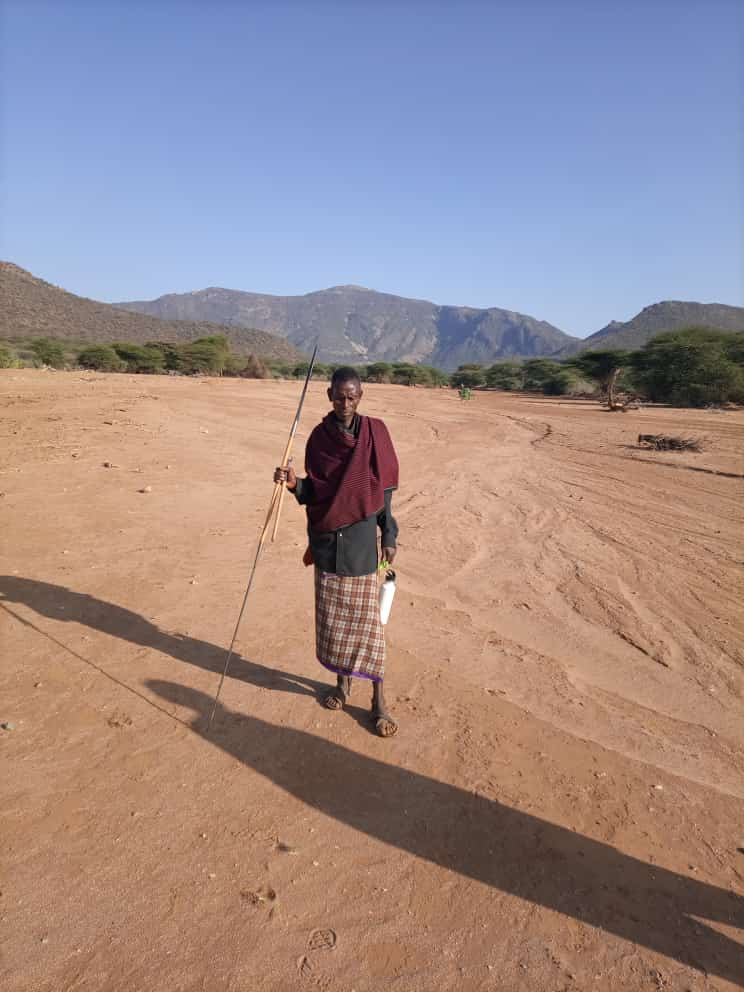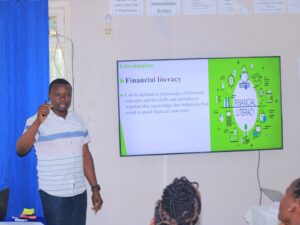
Claim For Community Land Rights Of The Yaaku Indigenous People Of Mukogodo Forest, Laikipia Kenya
Click here to see the original post in Voice.Global site-
Project Duration
12 months -
-
Lead organisation
Yiaku Laikipia Trust
-
Yiaku Laikipiak Trust (YLT) was founded in the year 2000 and officially registered in the year 2003 as a Self Help Group under the Societies Act of Kenya, in 2009 it upgraded to a Community Trust. Yiaku Laikipiak Trust was formed from the necessity of exposing and addressing the need for recognition and assistance on ensuring survival of the Yiaku indigenous peoples and local communities’ culture and habitat.
Since inception, YLT’s long-term priority is the revival of Yiaku language, Protection of Mukogodo Forest, Indigenous Knowledge and livelihood support for the Yiaku people.
The Yiaku People are a Cushitic tribe that migrated from Ethiopia in the 14th Century and settled in Mukogodo Forest in Laikipia North District in Kenya. They are a minority indigenous community with a population of about 6,000 people.
The Yiaku have maintained their culture, bushmeat hunting is illegal and the Yiaku seized hunting but remained with herding and gathering.
The Yiaku have lived in harmony with the Forest time immemorial since their traditional practices do not encourage logging and the building of permanent shelters in the Forest. They have sacred sites and ancestral graves and derive honey, wild fruits and vegetable from the Forest for a living.
Vision
To see a society whereby the rights and freedom of indigenous people and local communities in four counties are identified, recognized and respected and their culture, habitat and environment is preserved for posterity.
MISSION STATEMENT
To create enabling environment for enjoyment of the fundamental rights and freedom of the Indigenous people and local communities through their respective groups by way of capacity building activities and networking hence improved livelihood by 2050
-
Organisation
Yiaku Laikipiak Trust (YLT) was founded in the year 2000 and officially registered in the year 2003 as a Self Help Group under the Societies Act of Kenya, in 2009 it upgraded to a Community Trust. Yiaku Laikipiak Trust was formed from the necessity of exposing and addressing the need for recognition and assistance on ensuring survival of the Yiaku indigenous peoples and local communities’ culture and habitat.
Since inception, YLT’s long-term priority is the revival of Yiaku language, Protection of Mukogodo Forest, Indigenous Knowledge and livelihood support for the Yiaku people.
The Yiaku People are a Cushitic tribe that migrated from Ethiopia in the 14th Century and settled in Mukogodo Forest in Laikipia North District in Kenya. They are a minority indigenous community with a population of about 6,000 people.
The Yiaku have maintained their culture, bushmeat hunting is illegal and the Yiaku seized hunting but remained with herding and gathering.
The Yiaku have lived in harmony with the Forest time immemorial since their traditional practices do not encourage logging and the building of permanent shelters in the Forest. They have sacred sites and ancestral graves and derive honey, wild fruits and vegetable from the Forest for a living.
Vision
To see a society whereby the rights and freedom of indigenous people and local communities in four counties are identified, recognized and respected and their culture, habitat and environment is preserved for posterity.
MISSION STATEMENT
To create enabling environment for enjoyment of the fundamental rights and freedom of the Indigenous people and local communities through their respective groups by way of capacity building activities and networking hence improved livelihood by 2050
-
Project
The Yaaku indigenous people are the native owners and inhabitants of Mukogodo Forest which is found in Laikipia County. The Yaaku are yet to be recognized as a Kenyan tribe by the government of Kenya, however, as a community sharing common ancestry and habitat, the Yaaku find it most important to lay claim of their land the Mukogodo Forest. Parliament enacted the Community Land Act 2016 to facilitate communities to register their land and acquire community land titles and hence full control of their resources and benefits from within. The Yaaku are currently living under a group ranch title, community members are not aware that the government put in place a timeline for communities to register their land under the new legislation. There is a huge gap of information which we wish to address by holding community meetings and working with the group ranch officials to ensure that the Yaaku land is recognized and registered. Community members will also be educated on Free Prior and Informed Consent (FPIC) which is a strategy to ensure that no external entities will use or gain benefit of the resources belonging to the Yaaku without their consent. There is immense Traditional Ecological Knowledge deep in the Yaaku culture and environment that can be of great benefit to the community if proper mechanisms are put in place for recognizing, harnessing and sharing the resources.
To further archive the territory and biodiversity of the Mukogodo forest, we will use Geographic Information System (GIS) and drone mapping to show the boundaries, topography, biodiversity, indigenous plants, caves, sacred sites and shrines of the Yaaku people to prove the ancient connection of the Yaaku to the forest which is approximately 74,000 acres. The World Summit on the Information Society (WSIS) has twice noted officially that, “In the evolution of the information society, particular attention must be given to the special situation of indigenous peoples, as well as the preservation of their heritage and cultural legacy.” Indigenous peoples themselves recognized the importance of ICT in their 2003 Geneva Declaration of the Global Forum of Indigenous Peoples and the Information Society, stating:
“Information and communications technology (ICT) should be used to support and encourage cultural diversity and to preserve and promote the language, distinct identities and traditional knowledge of indigenous peoples, nations and tribes in a manner which they determine best advances these goals. The GIS interactive map will not only document the history and attachment of the Yaaku to their habitat but will also showcase the effects of external human interaction and climate change to the forest. The map will greatly assist in acquiring important ecological data that is otherwise knowledge for planning on interventions to conserve and protect the indigenous forest and the resources within. With the presence of a detailed map, it will be easy to locate sites that can be used for learning or tourism. The map will contain Yaakunte names to help in preserving the dying language of the Yaaku indigenous people.
-
-
The Yaaku indigenous people are the native owners and inhabitants of Mukogodo Forest which is found in Laikipia County. The Yaaku are yet to be recognized as a Kenyan tribe by the government of Kenya, however, as a community sharing common ancestry and habitat, the Yaaku find it most important to lay claim of their land the Mukogodo Forest. Parliament enacted the Community Land Act 2016 to facilitate communities to register their land and acquire community land titles and hence full control of their resources and benefits from within. The Yaaku are currently living under a group ranch title, community members are not aware that the government put in place a timeline for communities to register their land under the new legislation. There is a huge gap of information which we wish to address by holding community meetings and working with the group ranch officials to ensure that the Yaaku land is recognized and registered. Community members will also be educated on Free Prior and Informed Consent (FPIC) which is a strategy to ensure that no external entities will use or gain benefit of the resources belonging to the Yaaku without their consent. There is immense Traditional Ecological Knowledge deep in the Yaaku culture and environment that can be of great benefit to the community if proper mechanisms are put in place for recognizing, harnessing and sharing the resources.
To further archive the territory and biodiversity of the Mukogodo forest, we will use Geographic Information System (GIS) and drone mapping to show the boundaries, topography, biodiversity, indigenous plants, caves, sacred sites and shrines of the Yaaku people to prove the ancient connection of the Yaaku to the forest which is approximately 74,000 acres. The World Summit on the Information Society (WSIS) has twice noted officially that, “In the evolution of the information society, particular attention must be given to the special situation of indigenous peoples, as well as the preservation of their heritage and cultural legacy.” Indigenous peoples themselves recognized the importance of ICT in their 2003 Geneva Declaration of the Global Forum of Indigenous Peoples and the Information Society, stating:
“Information and communications technology (ICT) should be used to support and encourage cultural diversity and to preserve and promote the language, distinct identities and traditional knowledge of indigenous peoples, nations and tribes in a manner which they determine best advances these goals. The GIS interactive map will not only document the history and attachment of the Yaaku to their habitat but will also showcase the effects of external human interaction and climate change to the forest. The map will greatly assist in acquiring important ecological data that is otherwise knowledge for planning on interventions to conserve and protect the indigenous forest and the resources within. With the presence of a detailed map, it will be easy to locate sites that can be used for learning or tourism. The map will contain Yaakunte names to help in preserving the dying language of the Yaaku indigenous people.
-
-
Reset filters

